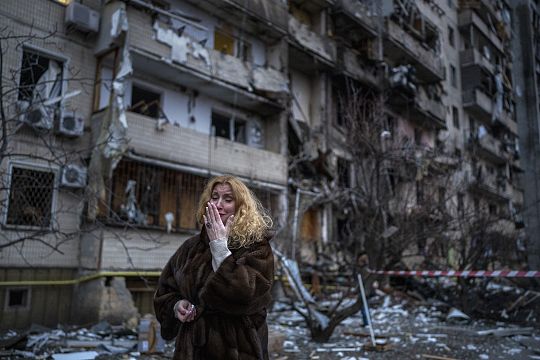Ukrainian refugees are flooding over the border into Poland and more explosions have been reported in the capital, Kyiv, as Russia’s invasion of the country enters its second day.
Polish border guards said that 29,000 Ukrainians had crossed the border into Poland as Ukrainians desperately tried to flee the Russian advance. Moscow claimed to have disabled airfields and radar stations across Ukraine and destroyed warplanes, helicopters, drones, tanks and missile defense systems.
Ukrainian President Volodymyr Zelenskyy called for more sanctions on Russia and argued that “the pressure on Russia must increase”. Ukraine’s Deputy Minister of Defence Hanna Malyar earlier said that Russian troops were heading towards Kyiv followed by a convoy of military trucks.
Air raid sirens were sounding in Kyiv on Friday morning, and Ukrainian MP Oleksandr Merezhko warned that a “new wave of bombing” by the Russian air force was coming.
How did we get here?
President Vladimir Putin said that Russia invaded Ukraine to protect the breakaway regions in the east of the country but Thursday’s military assault, which began at 5 am, also came from the north and the south.
Hans Kristensen, an associate fellow at Stockholm International Peace Research Institute, told Euronews that rather than an operation to shore up the self-proclaimed Donetsk and Luhansk People’s Republics, as Putin had claimed, the invasion is clearly an attempt to take as much of the country as Moscow can.
“This is total war, both in terms of how much territory they can take now and how much they can then hold after this is done. [Putin]wants to nullify the Ukrainian military so they can’t push back. So he can redraw the map,” Kristensen said.
NATO chief Jens Stoltenberg said on Thursday that Russia’s attack was “long-planned”, echoing weeks of warnings from the White House that Putin would invade.
Ukraine’s armed forces are heavily outgunned by Russia, experts say, but are stronger than in 2014, when Moscow seized Crimea and separatists in Donetsk and Luhansk began fighting for territory in the east, backed by Russia.
Russia has about 280,000 personnel and its combined armed forces total about 900,000 and its 2,840 battle tanks outnumber Ukraine by more than three to one, according to the International Institute for Strategic Studies (IISS). Although Ukraine trebled its defense budget in real terms from 2010 to 2020, its total defense expenditure in 2020 amounted to only $4.3 billion (€3.8 billion), just a tenth of Russia’s, Reuters reported.
NATO and the US have provided military aid to Ukraine but have ruled out sending troops. Putin warned on the first day of the conflict that if other nations did intervene, there would be “consequences that the world has never seen.”
Experts have warned that while Putin will likely be able to take Ukraine, keeping it would be very difficult.
So, what is the rest of the world doing?
French Finance minister Bruno Le Maire promised “immediate sanctions” on Friday that will punish Russia for “the foolish decisions of Vladimir Putin”.
“We want to isolate Russia financially. We want to cut all ties between Russia and the global financial system. We will dry up the financing of the Russian economy,” he said.
French President Emmanuel Macron confirmed that the European Union has agreed on an “unprecedented” 1.5 billion euro aid package for Ukraine.
The United Nations Security Council is due to vote on Friday on a resolution that demands the withdrawal of Russian forces from Ukraine, although it can — and will — be vetoed by Moscow.
The EU has imposed sanctions on Russia and has suggested that more are on the way, and Asian countries including Japan, Taiwan and South Korea have backed sanctions or imposed their own.
Of the major Asian powers, only India has stopped short of condemning the invasion or acknowledging the sovereignty of Ukraine. China is the only major global power to back Russia and blame the West.
What’s happening on the ground?
For Ukrainians from the east to Kyiv to as far west as Lviv, emotions have ranged from defiance to fear to confusion, and thousands of citizens have started to flee with their families.
Andriy Khlyvnyuk told Euronews on Friday that he had packed his kids off to his grandmother’s house and now was waiting for instruction from the government.
“If it’s needed I’ll take my gun and go fight for my country,” he said.
Kostyantyn, 33, a resident of Kharkiv was holed up in his mother’s house with his brother and was, like many, waiting to see what happened next.
“Right now, everybody is staying at home. People have put fuel in their cars or got groceries. We are all waiting for the instructions from the government. It’s not safe to travel,” he said
How will it end?
Radu Magdin, an analyst based in Bucharest, told Euronews that a lot will depend on what Ukraine does next militarily.
While Ukraine has successfully rallied the international community behind it, it remains to be seen whether it will be able to win on the battlefield in the coming hours and days.
That will determine what kind of presence Russia has in the country in the coming years.
“What kind of resistance will the Ukrainians mount now? Can the Russians get all the way to Kyiv? If they can, then in future negotiations, they will be at the mercy of Russia,” he said.

 Kyiv resident Natalia Sevriukova cries next to her house following a
rocket attack in Kyiv, Ukraine. February 25, 2022
Kyiv resident Natalia Sevriukova cries next to her house following a
rocket attack in Kyiv, Ukraine. February 25, 2022